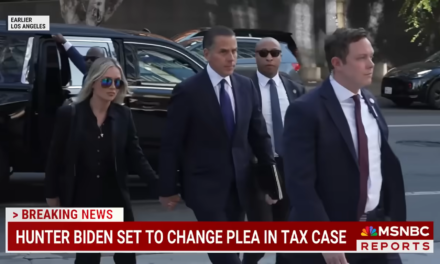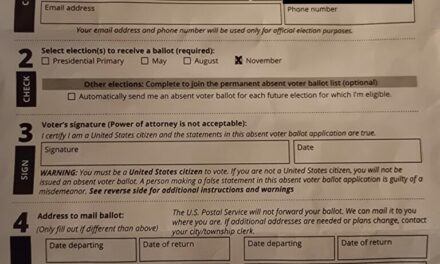We support our Publishers and Content Creators. You can view this story on their website by CLICKING HERE.
In advance of Tuesday’s vice presidential debate, the Democratic National Committee put up a billboard outside Madison Square Garden calling Donald Trump’s running mate, Sen. J.D. Vance, the “Poster boy for Project 2025.” As predicted by campaign email blasts, during the debate Kamala Harris’ running mate, Gov. Tim Walz, name-checked this blueprint for conservative federal governance, yet again proving the Harris-Walz campaign has zero policy accomplishments to run on.
Since most voters don’t care about this pretty unremarkable effort to slim an ungovernable federal bureaucracy and staff the next Republican administration with effective people loyal to the United States, it’s telling that Democrats have turned it into the only other issue they’re running on besides abortion until birth. It shows Democrats believe growing the unelected bureaucracy that undermines elected officials such as Congress and the president is their top priority (competing with murdering mostly black and brown babies in the womb).
It’s also yet more evidence they always push Republican defeat even in the event of Republican victory, because Project 2025 proposals are nothing more than simple common sense. A majority of voters, and three-quarters of solid Republicans, think the federal government is corrupt. And it is. It’s now obviously a far cry from early progressive fantasies about “apolitical experts.” It’s a politicized fifth column enacting regime change by substituting unelected, unconstitutional government for elected, constitutional government of, by, and for Americans.
While Trump has inexplicably lambasted the Project 2025 effort, several of its provisions are required to make his next presidency a success. No Republican presidency can function without the mass defenestration of bureaucrats who use their positions to hurt Trump’s voter coalition and their priorities.
A book out this year, Masters of Corruption, by former Trump appointee Mark Moyar, provides yet another vivid illustration of why. In it, Moyar, a former Trump appointee to the U.S. Agency for International Development, details how career bureaucrats sabotaged his whistleblowing on their corruption. His story shows that Trump has to prove to the people he needs for an effective presidency that he has their back, and that if they work to achieve Trump’s goals in office they will not be left twisting in the wind.
That’s effectively what happened to Moyar. A researcher with military and foreign policy experience, plus a PhD, Moyar wrote his sixth book in 2016. He submitted the manuscript for Defense Department review, in multiple ways going far above the legal and regulatory standards for ensuring he didn’t release classified information. After the department failed to review his manuscript despite receiving more than six times as much time to do so as court precedent allows, Moyar informed them he was moving forward with publication.
The book was published, and that was the end of it — until Moyar became a Trump appointee at USAID two years later and started to blow the whistle on corrupt employees. Then the manuscript review resurfaced. It was used as a pretense to deny Moyar the security clearance he needed to do his job, then ultimately to kick him out of the job on the grounds that he couldn’t do it without a security clearance. In a recent speech, Robert F. Kennedy Jr. said his uncle, President John F. Kennedy, started USAID to benefit U.S. policy, but it’s become a CIA front organization for regime change.
The entire time, no one ever provided any evidence that Moyar had published any classified material in his book that the Defense Department had failed — or refused — to review. And higher-level Trump appointees refused to defend Moyar against the bureaucratic jackals, leaving him defenseless. While his security clearance was held up simply out of spite, he couldn’t be hired for the majority of jobs for which he is qualified.
Torture by a Thousand Bureaucrats
That sounds Kafka-esque enough, yet it is a very brief gloss on the labyrinthian twists and turns that Moyar’s book relates. Reading them imparts a horror of ever getting caught in such a system embedded with people with the power to screw with you while they trap you there, all out of sheer hatred for political commitments that represent half the country.
Moyar’s story validates most Americans’ belief that their government is corrupt, and explains some core reasons why. These reasons include that federal agencies’ culture is controlled by those who swap favors to promote their careers and incomes. Those who don’t join the favor-trading system at the expense of taxpayers and executing policy on behalf of elected officials — i.e., the ethical employees — are quickly sniffed out and harassed until they leave or are forcibly ejected.
“My experience and research have convinced me that corruption and other unethical behavior are more prevalent in the federal government than most people realize,” Moyar writes. Moyar also notes that at a conference for lawyers of whistleblowers, “not a single lawyer would say that he would recommend to their clients that they report misconduct because retaliation is so prevalent.”
Personal Gain at Americans’ Expense
Moyar is also invaluable in underscoring that the inspector generals of federal agencies don’t exist to prevent abuse of power, but to cover up government misdeeds: “The community of inspectors general and their staffs ha[ve] evolved into a guild, resembling the guilds of shoemakers and blacksmiths during the Middle Ages … They were adverse to calling out fellow members for bad behavior, because the merest hint of impropriety could create enemies inside the guild, damage the guild’s reputation, and invite external scrutiny and interference.”
He details multiple cases he personally witnessed of corrupt and misbehaving federal employees cleared by their agencies’ inspectors general while those who blew the whistle on their behavior were stampeded out of their jobs after years of harassment. The misbehavers are typically rewarded with revolving-door jobs with government contractors or promotion within federal agencies.
“Few of the victims of inspector general misconduct have been able to get their stories into the public eye — another reason why I decided to write this book,” Moyar says.
Project 2025 Is About Defenestrating ‘The Resistance’
Moyar is not the only Trump appointee with a similar experience, by a long shot. During the first Trump administration, anti-Trump bureaucrats were the center of the so-called “Resistance.” They hamstrung his entire presidency with the Russia collusion hoax and two impeachments, plus myriad smaller efforts. These consumed great gobs of time, attention, and energy that Trump and his team could have devoted instead to lasting policy achievements.
Moyar points out that anti-Trump bureaucrats worked furiously to sabotage the work voters had elected Trump to accomplish. They organized within agencies like an internal spy ring. They used their government positions to — often illegally — leak half-truths to media in a way that would damage Trump’s ability to govern. In Zoom meetings, they “offered the federal employees tips for thwarting Trump appointees, such as concocting excuses for procedural delays, demanding protracted legal reviews, leaking information to sympathetic journalists, and bringing complaints to the inspector general,” Moyar writes.
Thousands of good people who risked their careers to advance Trump’s policy agenda were not only backstabbed by agency colleagues, like Moyar was, but also placed on Democrat target lists and personally and professionally harassed to this day. How is Trump going to get “the best people” if he can’t promise that, if they put targets on their backs to fight for the Americans he represents, he won’t abandon them to the sick mercies of vindictive leftists skilled in coordinated sabotage?
Trump’s Army Needs His Forceful Backup
Trump is one man. He can’t administer the entire federal government by himself, or even with his bigger-than-average family. He needs an army of personnel. Yet no army will sign up to fight if its leader can’t or won’t back them.
Trump’s disavowal of Project 2025 is exactly the opposite of projecting this key message to the thousands of competent corruption-fighters he needs to staff his administration. In contrast, Hillsdale College hiring Moyar as a professor of military history after the bureaucracy mauled him was the right message: You take a hit for working to better this country, we’ll take care of you.
Trump’s September promise to appoint Elon Musk to “conduct[] a complete financial and performance audit of the entire federal government” also is the right direction. A week later, Musk gave more details, according to a RealClearPolitics transcript: “We do have an opportunity to do kind of a once-in-a-lifetime deregulation and reduction in the size of government. Because the other thing besides the regulations, America is also going bankrupt extremely quickly.”
When asked if federal agencies could be cut by “two, three, four, five percent,” Musk replied, “I think we’d need to do more than that.” Yes, more — try at least a factor of ten.

 Conservative
Conservative  Search
Search Trending
Trending Current News
Current News 





